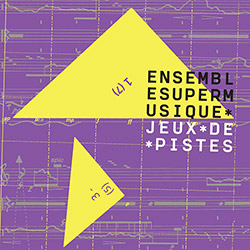
At this point, there is nothing innovative or even novel about the combination of improvisation and composition save the way the symbiotic relationship is achieved. On this score, Ensemble Supermusique succeeds on all counts. This disc offers up four of what might be described, loosely and inadequately, as graphic scores, though whatever images are involved are not nearly as graphic in detail as the excellent playing and recording.
The oldest entry is John Rea's "Tempest," composed in 1969 and here adapted for a much larger temporal canvas than its original two minutes. Sussurations and long-form semidrone encompass voices and instruments of deliciously indeterminate character, leaving aside the point or two at which identification is readily and vividly apparent. Entering and exiting as the proverbial lamb, everything bubbles and seethes with an energetic undercurrent, planes of sound nearly intersecting as unisons ebb and flow into each other, forming complex but clear sonorities that shake hands before exiting.
The other three scores were composed in the past few years, and easily the most whimsical among them is Malcolm Goldstein. Any fan of Ligeti's "Aventures" pieces will absolutely love this realization, such is its cheek and daring. Swoops and glides abound, punctuated by vocal outbursts reminiscent of Phil Minton at his seriocomic best. The occasional unison is fodder both for pause and momentary reflection before the zaniness recurs, turntable often at the ready and a wonderful upward and rapid flick out of focus concluding the proceedings. Danielle Palardy Roger's "TanGRAM" is a study in what Jack Kerouac, describing Proust's Cambre Cathedral, called slow concentric waves. According to shapes based on the ancient Chinese puzzle, we ascend and descend in arcs and lines that creep glacially in and out of cognition as timbres converge and diverge. There are a few similar passages in "Tempest," but "TanGRAM" is pure slow-motion bliss and horror as some percussion rolls a foundation of dread and dynamics slowly increase, eventually leading to fragmentation in the final minutes.
By way of total contrast, Jean Derome's "L'Argent" roils, beats and explodes with the unbridled passion only an energetic ensemble of improvisers and composers can bring to the table. Huge fits and starts pervade this sectionalized assault on the senses, and, were it not for a first-rate recording, much of its nuance would be lost in the noise. Fortunately, interstitial and timbral delineation is possible, and a few of the episodes are greeted by the whoops and hollers of a particularly appreciative audience. No sound is left unused, from looped electronics to all combinations of acoustic sonic layering; as with the rest of the discs, the results excite and mesmerize by turn, capturing what was undoubtedly a fiery and introspective performance.
Comments and Feedback:



More Recent Reviews, Articles, and Interviews @ The Squid's Ear...


|

